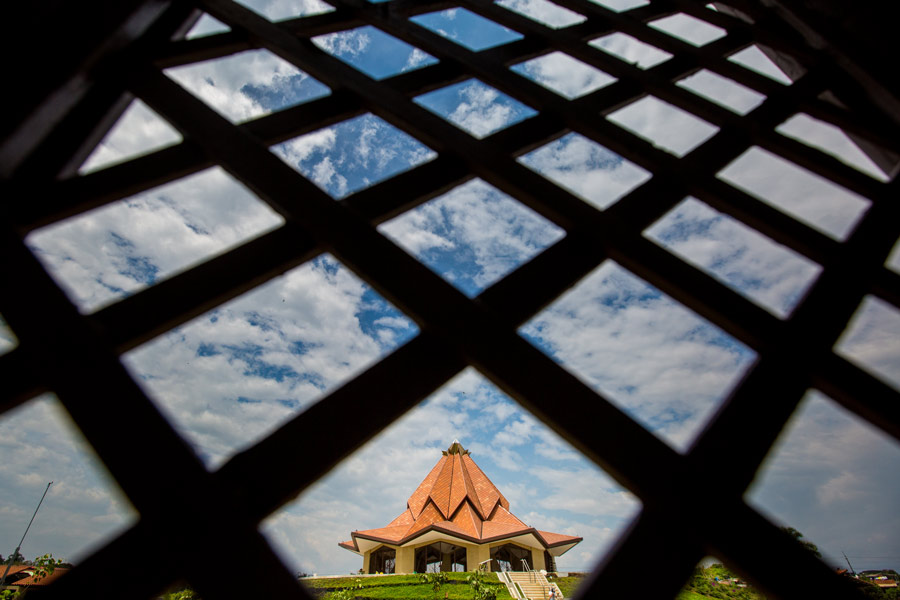In the Bahá’í Faith, the Houses of Worship stand as monumental manifestations of its teachings and social principles. These edifices, often referred to as “Mashriqu’l-Adhkár” or “Dawning Place of the Remembrance of God,” serve not merely as places for individual worship but as vibrant spiritual centers for the community at large. Their architectural beauty often mirrors their underlying ethos of unity, inclusivity, and service — the core tenets of Bahá’í teachings.
The significance of Bahá’í Houses of Worship extends beyond their physical construct. They are designed to be open to people of all faiths and backgrounds, promoting an atmosphere of interfaith dialogue and cooperation. This inclusivity is integral to the Bahá’í vision of a united world, where distinctions of race, religion, and nationality are transcended in the pursuit of collective spiritual and social advancement.
Moreover, the Bahá’í Houses of Worship are not merely venues for prayer; they are dynamically integrated into the fabric of community life. Each House of Worship hosts a myriad of activities that foster educational enrichment, social activities, and humanitarian initiatives. This multifaceted approach helps cultivate a sense of belonging among diverse populations, reinforcing the ideal that spiritual development is inexorably linked with social progress.
The architectural design of each House of Worship reflects local culture and traditions, while also adhering to the universal principles outlined in Bahá’í teachings. The central hall is often surrounded by gardens, symbolizing beauty and tranquility, thus creating a holistic environment conducive to reflection and growth. Such design elements are not mere aesthetics; they embody a deep spiritual significance that resonates with believers and visitors alike.
Importantly, the construction and maintenance of these Houses are often community-driven initiatives, underscoring the importance of collective action and responsibility. Local Bahá’í communities rally together to support these endeavors, whether through financial contributions, volunteer work, or community outreach. This strengthens the sense of unity and collaboration, pivotal elements in Bahá’í philosophy.
Furthermore, Bahá’í Houses of Worship often feature educational programs aimed at nurturing the intellectual and spiritual capacities of individuals. These programs can range from classes exploring the principles of the Bahá’í Faith to workshops emphasizing moral education and ethical decision-making. This emphasis on education aligns with the Bahá’í belief that knowledge is a source of both personal empowerment and societal advancement.
In addition to educational initiatives, these spiritual centers often serve as hubs for social action. They frequently host discussions on pressing global issues, ranging from poverty alleviation to environmental sustainability. By addressing such topics, Bahá’í Houses of Worship encourage community members to take proactive stances on matters affecting humanity. This nexus between spirituality and social responsibility exemplifies the Bahá’í commitment to fostering a just and equitable society.
The melange of activities orchestrated within Bahá’í Houses of Worship exemplifies the idea that spiritual and social life should be inextricably linked. Regular public meetings, prayer services, and discussions are conducted, all aimed at deepening understanding and promoting fellowship. The inclusive atmosphere encourages individuals to come together, share their thoughts, and engage in meaningful dialogue, fostering a community spirit that embodies the essence of Bahá’í teachings.
A particularly unique aspect of Bahá’í Houses of Worship is their focus on youth and children. These centers often provide special programs tailored to younger generations, allowing them to explore their spirituality, cultivate their talents, and develop their leadership skills. Engaging the youth not only ensures the continuity of Bahá’í principles but also empowers them to contribute positively to their communities.
Importantly, the global Bahá’í community recognizes the need to adapt to changing societal needs. As such, the nature of activities at the Houses of Worship evolves based on local context and the unique challenges faced by the community. Whether it be offering support during crises or launching initiatives that respond to the immediate needs of the population, these spiritual centers remain responsive and relevant.
In addition to their active role within local communities, Bahá’í Houses of Worship have developed a global presence. The unique architectural designs of the temples invite individuals from all corners of the earth to visit, fostering an international spirit of unity and respect. Each House of Worship thus becomes a symbol of the global Bahá’í community, transcending geographical boundaries and time zones, illustrating the universality of its teachings.
As pillars of spiritual life, the Bahá’í Houses of Worship advocate for the essential principle that humanity must work together to resolve its most pressing issues. They exemplify a hopeful vision of the future, demonstrating that through mutual understanding and cooperative action, individuals can create communities marked by peace, justice, and love. In essence, these sacred spaces are not only sanctuaries for worship but also a powerful impetus for community development and transformation.
In conclusion, Bahá’í Houses of Worship embody a rich amalgamation of spiritual reverence and social engagement. They are designed to inspire, educate, and empower individuals, serving as engines of community life and development. These edifices stand as testaments to the profound belief that when humanity unites, it can achieve remarkable progress in both spiritual and material realms. They are, indeed, the Dawning Places of the Remembrance of God, guiding individuals towards a deeper understanding of their purpose and the interconnectedness of all humankind.
